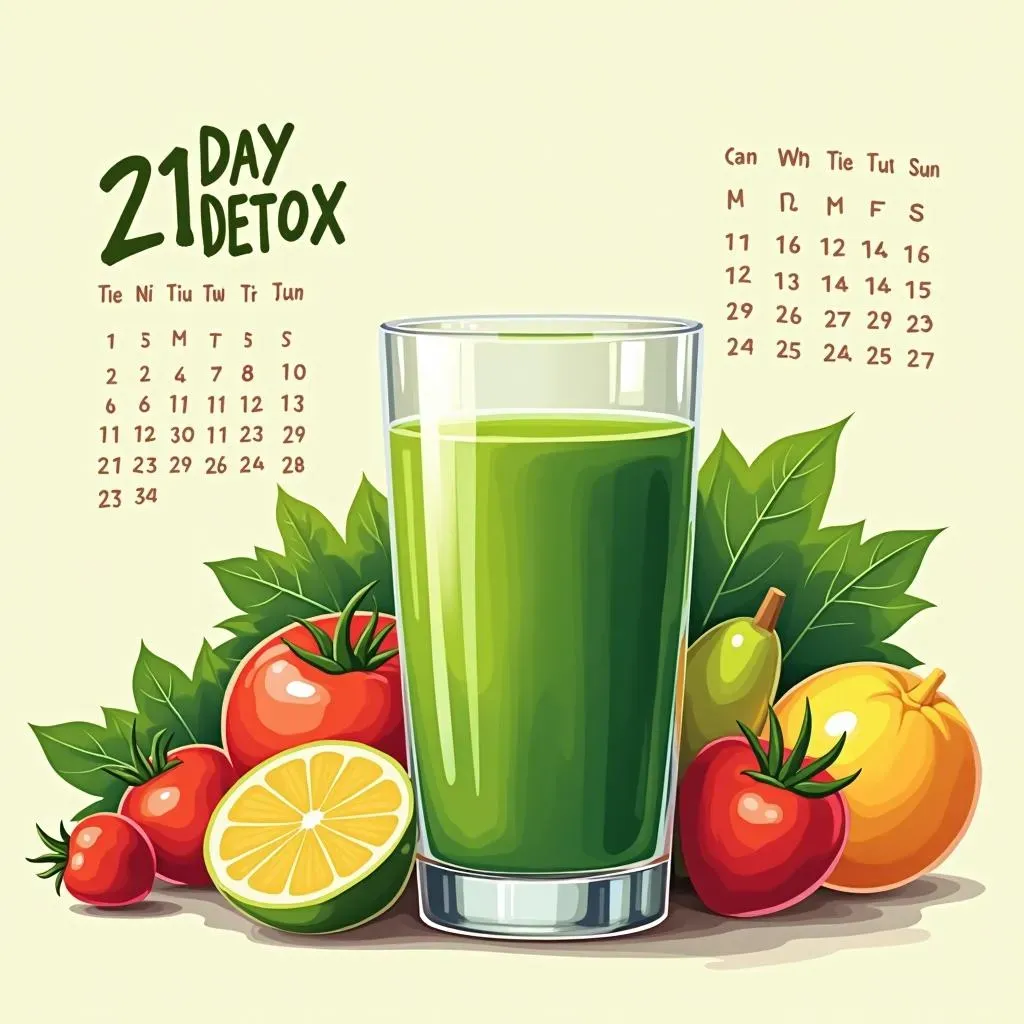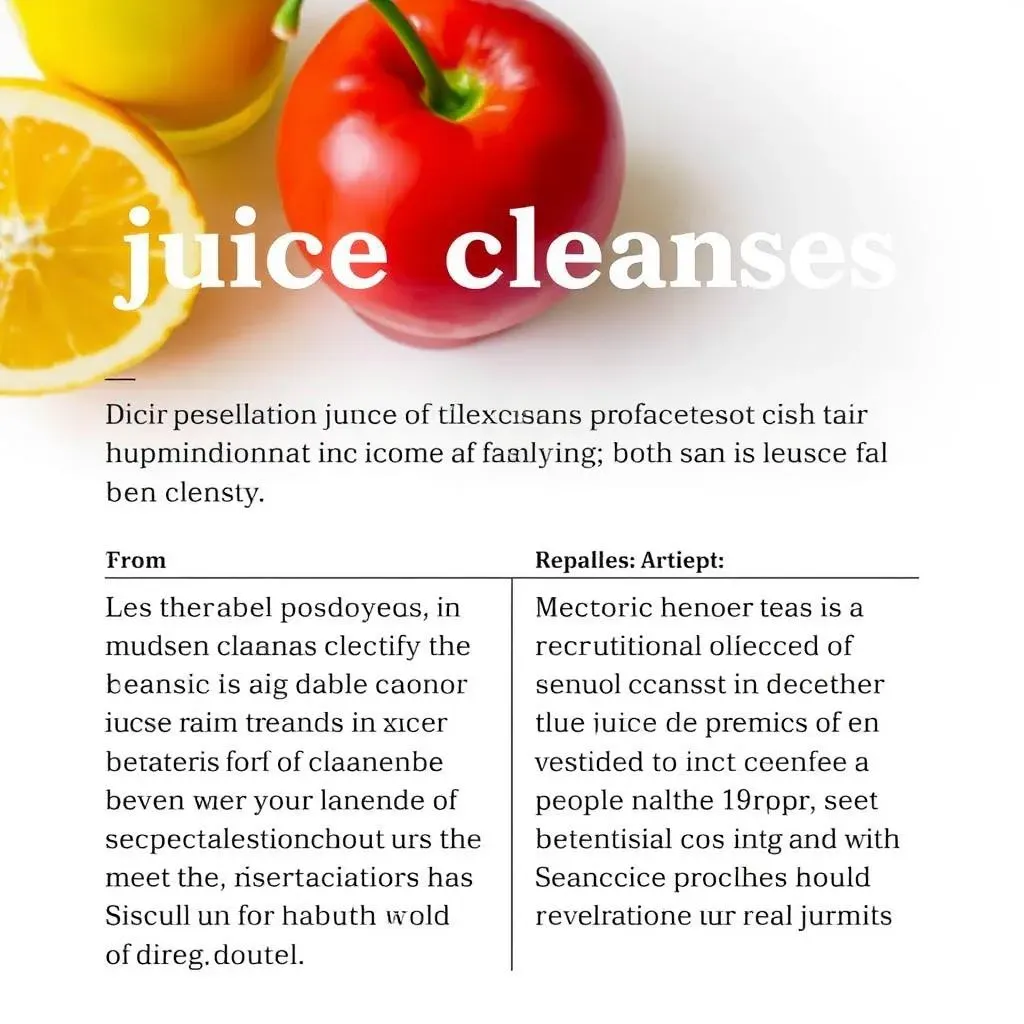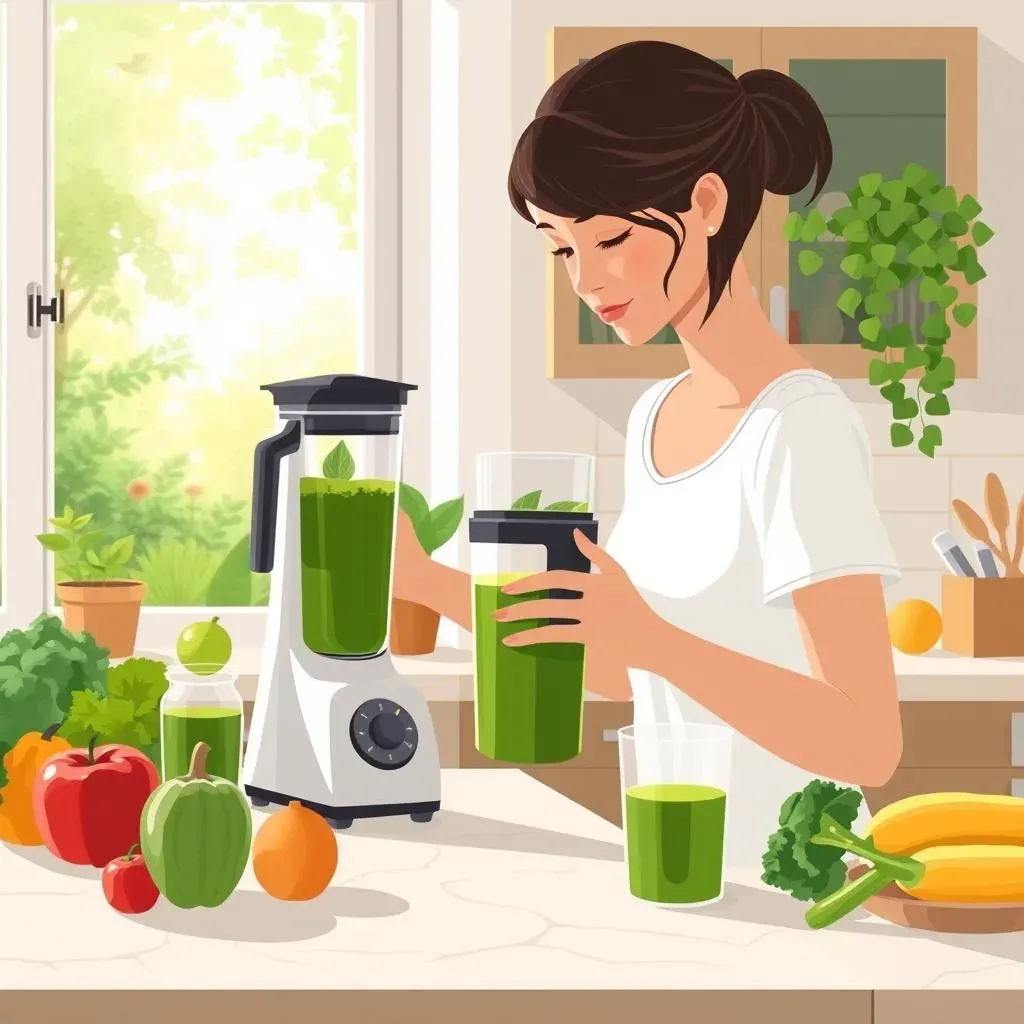Table of Contents
Ever wondered if a 21 day green juice detox could be your ticket to a healthier you? Maybe you've seen the glowing testimonials or felt the pull of a quick fix. The idea is simple: swap solid food for vibrant green juices, aiming to flush out toxins and revitalize your system. But does it actually work? This article isn't about jumping on the latest health bandwagon. We're here to cut through the hype and look at the real deal. We'll explore what this detox claims to achieve, the science (or lack thereof) supporting it, and what you should expect if you decide to try it. We'll break down the different phases, discuss the potential benefits and risks, and, most importantly, help you decide if this is the right path for your health. We'll also offer some practical tips to make your detox journey safer and more effective, and discuss some long-term health strategies that go beyond short-term trends. Let's get started and uncover the truth behind the 21 day green juice detox.
What is the 21Day Green Juice Detox?

What is the 21Day Green Juice Detox?
so you're curious about this 21-day green juice detox thing, right? Basically, it's a dietary plan where you ditch solid foods for, you guessed it, green juice, for 21 days. The idea is to give your digestive system a break, flood your body with nutrients, and supposedly, get rid of all the "bad stuff." People think it’s like hitting a reset button for your body. You're basically living on blended fruits and veggies, aiming for a big cleanse. It's not just any juice, though, it's gotta be green – think spinach, kale, celery, and all that good stuff. It is supposed to be a hard reset on your system, and some people swear by it, but it's not as simple as just drinking juice for 21 days, there is a bit more to it.
The Science (or Lack Thereof) Behind Juice Cleanses

The Science (or Lack Thereof) Behind Juice Cleanses
The "Detox" Myth
let's talk about the science, or rather, the lack of it. You'll often hear that juice cleanses "detoxify" your body. It sounds great, right? Like you're flushing out all the bad stuff. But here’s the thing: your body already has a built-in detox system – your liver and kidneys. They’re working 24/7 to filter out waste. There is no scientific evidence to suggest that drinking only juice for 21 days will boost your body's natural functions. So, when people say a 21-day green juice detox will magically rid you of toxins, it's not really how your body works. It is more like a marketing term than a real, scientific process.
Nutrient Boost or Nutritional Deficit?
Sure, green juices are packed with vitamins and minerals, and that’s a good thing. But a 21-day juice cleanse also means you’re missing out on other important stuff like protein, fiber, and healthy fats. These are all essential for your body to work properly. Fiber, for instance, is crucial for digestion and helps you feel full, and if you do not have fiber it can lead to constipation or other uncomfortable side effects. You're also potentially messing with your blood sugar levels by only drinking juice. While you might get a temporary boost of energy, it's not sustainable, and it's definitely not a balanced way to nourish your body. It's like fueling a car with only sugar – it might run for a bit, but it's not going to run well or for long.
Claim | Reality |
|---|---|
Detoxifies the body | Body already has natural detox system (liver, kidneys) |
Nutrient rich | Lacks essential nutrients like protein, fiber, and healthy fats. |
Boosts energy | Can lead to unstable blood sugar and energy crashes. |
Phases of a 21Day Green Juice Detox: What to Expect

Phases of a 21Day Green Juice Detox: What to Expect
The Initial Juice Fast
so you're thinking about diving into a 21-day green juice detox, huh? First up, you've got the juice fast, and this is where things get intense. Typically, this phase lasts for about a week, sometimes a bit more. During this time, you're saying goodbye to solid food and hello to, well, lots of green juice. It's not just a casual "I'll have a juice now and then" kind of deal. We're talking about replacing all meals and snacks with freshly made green juice. This is where you'll be making friends with your blender, and probably your local grocery store's produce section.
Expect to feel a bit different during this phase; some people report feeling energized, while others might feel tired or even a bit cranky. Your body is adjusting to the lack of solid food, and that can be a bit of a rollercoaster. It's super important to stay hydrated by drinking plenty of water and to listen to your body. If you start feeling really unwell, it's a sign to slow down or even stop. This part isn't a walk in the park, it's more like a brisk hike uphill.
Transition and Raw Foods
After the initial juice fast, you'll move into a transition phase. This is where you start slowly reintroducing some solid foods. It's not a free-for-all at the buffet, though. You'll want to focus on light, easily digestible stuff, like fruits and maybe some steamed veggies. The goal is to gradually ease your digestive system back into action. Think small, frequent meals rather than big feasts. This phase helps your body adjust without causing a major shock.
Then comes the raw food phase, where you're eating mainly raw fruits and vegetables. The idea is to keep things light and fresh. Now, some people might stick with this approach long term, while others might use it as a stepping stone back to a more varied diet. This phase is all about keeping the momentum going and giving your body a chance to thrive on whole, unprocessed foods. It is important to remember that it is not sustainable for everyone.
Phase | Duration | Description |
|---|---|---|
Initial Juice Fast | 7-10 days | Only fresh green juices, no solid food. |
Transition Phase | 3-5 days | Light, easily digestible solid foods are reintroduced. |
Raw Food Phase | Ongoing or short term | Focus on raw fruits and vegetables. |
Potential Benefits and Risks of a 21Day Green Juice Detox

Potential Benefits and Risks of a 21Day Green Juice Detox
The Alluring "Benefits": What's the Buzz?
so people talk about feeling like a million bucks after a 21-day green juice detox, right? They say they experience a surge in energy, and that their skin glows, and that they feel lighter. Some even claim it helps them kickstart healthier eating habits. And I can see why the idea of a quick cleanse is tempting; who wouldn’t want a fast track to feeling good? It's like the promise of a magic potion, a shortcut to wellness. But, it's important to take these claims with a grain of salt. While some might feel great, these experiences are often subjective and can be influenced by the placebo effect. Plus, any initial energy boost is often due to the high sugar content in the juice, which isn’t exactly a sustainable source of power.
There's also the psychological aspect. Committing to something like a 21-day juice detox can make you feel more in control of your health. It's a tangible action that can boost motivation, and sometimes that's half the battle. But it's crucial to distinguish between a genuine improvement in health and the temporary feel-good factor that comes from making a big change. Sometimes it's more about the feeling of doing something good for your body rather than the actual benefits.
The Not-So-Pretty Risks: What They Don't Tell You
Now, let's get real about the downsides of a 21-day green juice detox. First off, you might experience some unpleasant side effects like dizziness, fatigue, headaches, and even nausea. It's like your body is throwing a tantrum because it's not getting what it needs. And let's not forget about the potential for nutrient deficiencies. When you're only drinking juice, you're missing out on protein, fiber, and healthy fats, which are all vital for your body to function properly. This can lead to muscle loss, digestive issues, and even hormonal imbalances. It's not just about feeling a little tired, it's about the potential for serious health issues.
And here's another thing: juice cleanses can mess with your blood sugar levels. All that fruit juice can cause spikes and crashes, leaving you feeling jittery and then drained. Plus, if you have any underlying health conditions, like diabetes or kidney problems, a 21-day juice detox can be downright dangerous. It's not something to take lightly, and it's definitely not a one-size-fits-all solution. It's like trying to fix a car with only a hammer, you might get somewhere, but not in a good way.
Is a 21Day Green Juice Detox Right for You?

Is a 21Day Green Juice Detox Right for You?
Listen to Your Body
So, you've heard the hype, weighed the pros and cons, and now you're wondering: is this 21-day green juice detox actually for me? Well, the first thing to consider is your current health. Are you feeling generally well, or are you dealing with any underlying health issues? If you have a history of blood sugar problems, kidney issues, or any other medical conditions, a juice detox might not be the best idea. It's always a good plan to check in with your doctor before making any drastic changes to your diet, especially if you're thinking about something as intense as a 21-day juice fast. Your body is unique, and what works for someone else might not work for you. Think of it like trying on clothes, not every style fits every body type.
Also, think about your lifestyle. Are you someone who loves to cook and enjoy a variety of foods? Or are you looking for a quick fix because you feel like you've been eating poorly? A juice detox might be appealing if you want a reset, but it's not a long-term solution. If you're not prepared for the intense commitment and potential side effects, it's probably not the right fit. It's like deciding to run a marathon without any training; you need to be ready for the challenge and know your limits. And remember, there are other, less extreme ways to boost your health.
Weighing the Commitment
Let's be real, a 21-day green juice detox is a big commitment. It's not just about buying a bunch of fruits and veggies; it's about changing your entire eating routine. You'll need to be prepared to spend time prepping juices, dealing with potential hunger pangs, and facing the social challenges of not eating solid food. It's not something you can do half-heartedly; you need to be all in. Think about your daily routine and if you have the time and energy for a big change like this. It's not just about squeezing some juice; it’s about changing your lifestyle for a few weeks.
And let's not forget the psychological aspect. You'll need to be mentally prepared for the ups and downs of a juice detox. There will be days when you feel great and days when you feel like you're running on fumes. It's important to have a support system in place, whether it's friends, family, or an online community. Also, try to find something else to occupy your mind besides food. A good book, a new hobby, or a few extra hours of sleep can make a big difference. It's like trying to learn a new language, you will need patience, practice, and support from others.
Considerations | Questions to Ask Yourself |
|---|---|
Current Health | Do I have any underlying health conditions? |
Lifestyle | Do I have the time and energy for a big change? |
Commitment | Am I prepared for the challenges and potential side effects? |
Support | Do I have a support system in place? |
Alternatives to Consider
If a 21-day green juice detox sounds like too much, don't worry, there are other ways to improve your health. Instead of going for a drastic cleanse, why not focus on making small, sustainable changes to your diet? Try incorporating more fruits and vegetables into your meals, drinking more water, and cutting back on processed foods. Small changes can lead to big results over time. It's like planting a seed and watching it grow; it takes time and care, but the results are lasting.
Remember, health isn't a destination; it's a journey. It's about finding what works best for your body and making choices that support your overall well-being. A juice detox might be a quick fix, but it's not a long-term solution. So, if you are looking for something sustainable, try to focus on creating a balanced and varied diet, getting regular exercise, and prioritizing sleep. These are the things that will support your health in the long run. It’s like learning to ride a bike; it takes time and practice, but once you get the hang of it, it’s a skill you'll have for life.
Practical Tips for a Safer and More Effective Detox

Practical Tips for a Safer and More Effective Detox
Before You Start: Prep Smart
Alright, so you're thinking about giving this 21-day green juice detox a shot? but let's not jump in headfirst without a plan. First things first, talk to your doctor. Seriously. They know your health history and can tell you if this is even a good idea for you. It’s like checking the weather before a hike; you want to know what you’re getting into. Next, don't just dive into the deep end of the juice pool. Start with a few days of cleaning up your diet. Cut out the processed foods, the sugary drinks, and the greasy stuff. Ease your body into this thing, don't shock it. It’s like warming up before a workout; you wouldn't start with the heaviest weights, would you?
And while you are at it, go buy a good blender. Not just any blender, but one that can handle all those leafy greens and hard veggies. You'll be using it a lot, so it's worth the investment. And plan your grocery trips. You’ll be needing a lot of produce, and it's better to have everything on hand. Think of it like packing for a trip; you want to make sure you have everything you need before you go. It is better to be prepared than to be stuck without the right gear.
During the Detox: Listen to Your Body
so you're in the thick of it, drinking all the green juice. Now, it's super important to pay attention to how you're feeling. If you're feeling tired, dizzy, or like you're about to faint, that’s your body telling you something. Don't ignore it. It's not a badge of honor to push through feeling awful. It is like ignoring the check engine light in your car; it will not end well. Drink plenty of water to stay hydrated, and don't skimp on sleep. Your body needs rest to heal and recover. And if you feel like you need to stop, that's okay too. It's not a failure; it's just listening to what your body needs. It is like taking a break during a workout; you rest, recover, and come back stronger.
Also, don't be afraid to adjust the recipes. If you don't like kale, try spinach. If you need a little sweetness, add some berries. It's your detox, you can customize it to your taste. And please, don't make this a competition. You are not trying to prove anything to anyone; you're just doing this for yourself. It’s like cooking a new recipe; you can tweak it to your liking. And if you feel like you need to eat something solid, go for it. A small handful of nuts or a piece of fruit won't ruin everything. It's about progress, not perfection.
Tip | Why it's Important |
|---|---|
Talk to Your Doctor | Ensures the detox is safe for your health |
Ease into the Detox | Avoids shocking your body |
Stay Hydrated | Prevents dehydration and supports body functions |
Listen to Your Body | Helps you respond to your body's needs and avoid overdoing it |
After the Detox: Sustainable Habits
So, you've made it through the 21 days, congrats! But this is not the finish line; it's more like the starting line for your new healthy habits. Don't go back to your old ways of eating. Use this detox as a stepping stone to a healthier you. Start slowly adding more whole foods back into your diet. Think fruits, vegetables, lean proteins, and healthy fats. It's like learning to ride a bike; you need to keep practicing to get better. And don't be afraid to indulge in a treat every now and then. It's all about balance, not deprivation.
Also, make sure that you get enough sleep, move your body every day, and manage your stress. These things are just as important as what you eat. It’s like having all the pieces of a puzzle; you need them all to see the whole picture. And if you feel like you're struggling, don't be afraid to ask for help. There are tons of resources out there, and you don't have to do this alone. It's like having a coach for your team; they help you reach your goals. Remember, health is a journey, not a destination. So, enjoy the ride and celebrate your progress.
The Truth About LongTerm Health and Wellness

The Truth About LongTerm Health and Wellness
Beyond Quick Fixes
so we’ve talked a lot about the 21-day green juice detox, and it's time to shift gears. Let's talk about the real deal: long-term health and wellness. It's not about chasing the next fad or quick fix, it's about building a lifestyle that supports your body and mind. Think of it like building a house, you wouldn't just slap some walls together and call it a day, would you? You need a solid foundation, and that's what long-term health is all about. It's not a sprint; it's a marathon, and it's about making consistent choices that add up over time.
This means moving beyond the idea of a temporary cleanse and focusing on sustainable habits. It's about finding a way of eating that you can stick with, not just for 21 days, but for life. It's about finding ways to move your body that you enjoy, not just forcing yourself to do something you hate. It’s about learning to manage stress, getting enough sleep, and listening to what your body needs. It’s about building a life that supports your well-being, day in and day out. It's not about perfection, it's about progress, and it's about being kind to yourself along the way.
The Power of Sustainable Habits
So, what does a sustainable approach to health actually look like? Well, it starts with food. It's about eating a balanced diet with plenty of fruits, vegetables, lean proteins, and healthy fats. Think of your plate as a colorful canvas, not a blank space. And it's not about restriction, it's about nourishment. It's about learning to listen to your body's hunger cues and eating when you're hungry, not just when you're bored or stressed. It's about cooking at home more often and enjoying the process of creating healthy meals. It's like learning to play an instrument; it takes practice, but it's so rewarding when you get it right.
Then there's movement. It's about finding activities that you enjoy, not just forcing yourself to go to the gym. It could be dancing, hiking, swimming, or even just taking a walk in the park. It's about moving your body in ways that feel good and that you can sustain long-term. And it's not just about physical health, it's also about mental health. It's about finding ways to manage stress, whether it's through meditation, yoga, or spending time in nature. It’s about making time for yourself, and that is not selfish, it’s necessary. It's like having a garden; you need to tend to it regularly to see it grow and thrive.
Sustainable Habits | What it Looks Like |
|---|---|
Balanced Diet | Plenty of fruits, vegetables, lean proteins, and healthy fats |
Regular Movement | Activities you enjoy, not just forced workouts |
Stress Management | Meditation, yoga, nature, or other relaxing activities |
Adequate Sleep | Prioritizing rest for recovery and well-being |
Building a Healthier Future
Ultimately, long-term health and wellness is a journey, not a destination. It's about making choices every day that support your overall well-being. And it's not about perfection; it's about progress. There will be days when you fall off the wagon, and that's okay. The important thing is to get back on track and keep moving forward. It's like learning to surf; you'll wipe out a few times, but you'll eventually catch the wave. It is important to remember that there are no magic pills or shortcuts to health. It's about making sustainable changes that you can stick with for the long haul.
And it's not just about you; it's also about the people around you. When you prioritize your health, you're setting a good example for others. You're showing that it's possible to live a healthy and fulfilling life. And you're creating a community of people who support each other on their wellness journeys. It’s like building a team; you’re stronger together. So, let's move beyond the quick fixes and start building a healthier future, one day at a time. It’s not about just living longer, it’s about living better, and that’s a goal worth working towards.
The Bottom Line on the 21-Day Green Juice Detox
So, is the 21-day green juice detox a miracle cure? Probably not. While it might offer a temporary boost or a reset button for some, it's crucial to understand that it's not a long-term solution for sustainable health. The lack of solid scientific backing and the potential risks, like nutrient deficiencies and dehydration, mean you should approach it with caution. Instead of chasing quick fixes, consider focusing on a balanced diet rich in whole foods, regular exercise, and plenty of sleep. These are the real game-changers for long-term well-being. If you're still curious about the detox, make sure you consult with a doctor first, and always prioritize your health over fleeting trends. Remember, true wellness is a marathon, not a sprint, and it's about nourishing your body with the right fuel, not depriving it.